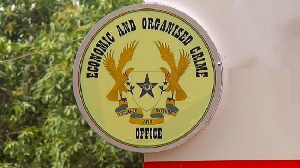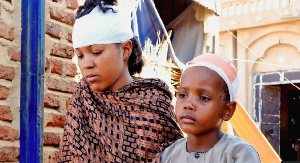BRATTLEBORO, US -- A truckload of donated bicycles, parts and tools collected in Brattleboro is due to leave Vermont this week bound for the West African nation of Ghana.
The shipment is the work of St. Michael's Episcopal Church, which launched the project as a way to help young people in Ghana learn the trade of bicycle repair and gain much-needed transportation.
The 450 or so bikes were donated over the course of two weeks in October by locals who heard the church's call.
"The bikes came out of the woodwork," said Lawrin Crispe, a Brattleboro lawyer and church member who helped organize the effort. "We couldn't believe how many we accumulated in a very short period of time."
Some of the bikes arrived in great shape; others were barely rideable. They came from basements, attics, and barns and from the storage room of the local police department. Some were antiques.
"We got a few Schwinns that are absolute classics," said Hilary F. Cooke, another organizer. "We welcome them all, whatever shape they're in."
Many of the bikes will be broken down into parts. Brattleboro-area bike shops also donated tires and tubes, spokes, wheels, sprockets and other items. The shipment will also include bike frames.
"When they assemble them over there, they'll be a really reliable source of transportation -- a proud source of transportation," Cooke said.
The idea of shipping bikes to needy countries is not new -- it's been going on for years through organizations such as the Boston-based Bikes Not Bombs, which says it has sent about 20,000 bicycles to Africa and Latin America. This month, Bikes not Bombs is also sending 500 bikes to Accra, Ghana -- near the suburb where the St. Michael's bicycles are headed.
But Cooke and his partners in the Brattleboro project believe theirs is the first such effort in Vermont, and they would like to continue it next year. Vermonters have a lot of bicycles to spare, they said.
"Everybody seems to have a bike, no matter what their income status, that they're not using," said Naima K. Wade, another organizer. "We had to stop taking some of the bikes because there were so many."
The Brattleboro bikes are going to a program called the Homeland Youth Empowerment Organization, near Accra, the Ghanian capital. Through the program, young people will learn to put the bikes together, and if they finish the project, they'll be able to keep the bicycle, said Wade.
St. Michael's got some help from Cooke's brother-in-law, Edward Brynn, a Montpelier native who was U.S. ambassador to Ghana in the mid-1990s. Brynn volunteered to use his contacts in Accra to make sure the shipment arrives safely.
Bikes -- and books -- are what Ghana needs the most, said Brynn, who now runs international programs for the University of North Carolina in Charlotte.
One reason bikes are so useful is that fuel is prohibitively expensive for Ghanians, who have a per capita income of about $550 a year. Ghana doesn't produce bikes domestically, and even second-hand bikes are also out of reach for most Ghanians, Brynn said.
Bikes work well in Ghana because, unlike many sub-Saharan African countries, it has a network of paved roads necessary for bicycle travel in a climate subject to monsoon-type rains.
It also has plenty of bike repair shops, Brynn said.
Wade, a teacher at Brattleboro Union High School, said she hopes other non-profit groups will help with the bicycle donations next time around, perhaps by offering their own collection sites. She's also considering collecting something else, such as sewing machines, for shipment to Ghana.
"What we'd like to do is get other faith communities involved next year," she said.
It's costing the church about $5,600 to send the shipping container to Ghana. The container company gave the church a reduced price, and the church raised the rest of the money through donations, Cooke said.
The bicycle project is one of many international projects undertaken by members of St. Michael's, said Crispe, who came up with the idea of sending the bikes. Church members seek to reach out to other communities, cultures, and religions, Crispe said.
"When you read the paper or watch the news you feel like you want to do something, anything, to try to reach out to the global community," Crispe said. "These are tough times; there's a lot of hardship around the world.
"If we as a small little parish here in Brattleboro can extend a hand in some fashion, it might make a small difference."
General News of Saturday, 10 January 2004
Source: AP












